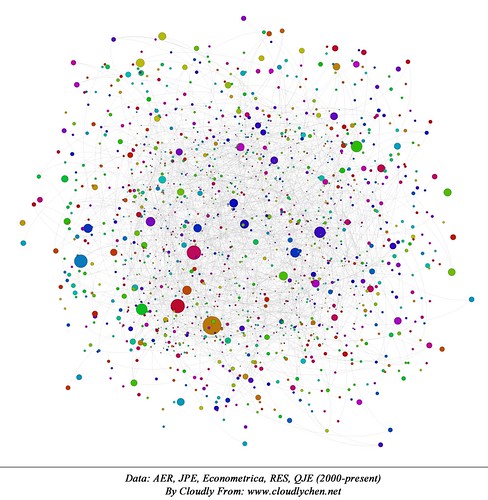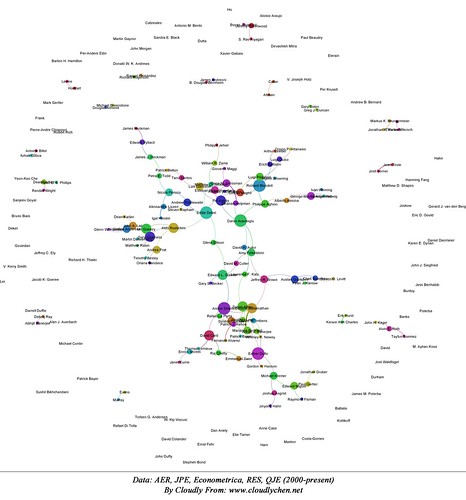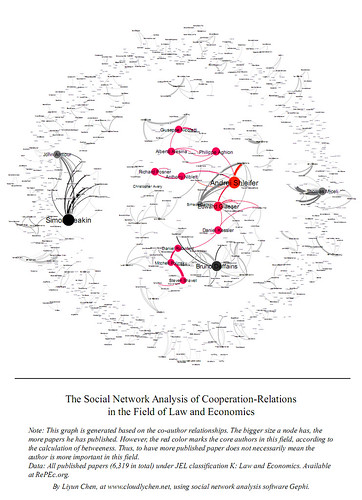This week was pretty busy: seminars, my own presentation and of course, problem sets, and especially, Chinese New Year.... Well, it worth a brief summary.
Seminars began from the past Tuesday: I skipped the boring advanced macro class and went to the labor seminar series. The presentation was:
Alessandro Tarozzi (Duke University)
"Micro-loars, Insecticide-treated Bednets and Malaria: Evidence from a Randomized Controlled Trial in Orissa (India)"
Due to the reason that I may need to work on a public health/ health econ topic joint with a classmate as the final master project, I have to learn more about what they are doing in health econ. Although the presented paper was from an applied/metrics view, it was still interesting to see what problems they had met in the field works...
Another seminar was one of the recruiting one, offered by:
Speaker: Konrad Burchardi (London school of Economics)
Title: The Economic Impact of Social Ties: Evidence from German Reunification (with T. A. Hassan)
I should admit that I have been always curious about the job market papers: they can be downloaded from the Internet, and well-packed. How incentive compatiable they are! Moreover, I do care about this topic: social ties.... well, it was so sad that when he talked about the German history, I knew nothing and was quite confused with the process which he did not need to explain too much to other audience....my poor storage of European history knowledge! To be honest, during the seminar, I was wondering one thing: is he reading EJMR as well? From the forum, they are discussing this year's job market hotly, so there is a big chance that some of the speakers may also be a part of the readers/contributors. Woo, that would be an intersting question if their true types have been finally revealed by linking the real person with the online IDs....
Actually, just before the recruiting seminar, I gave my first (academic) presentation in class. Since it was the first time for me to present in front of a group of Ph.Ds and totally in English, I felt quite stressful before the presentation. But it went much better than I had expected. I was pretty impressed by the active classmates - they were so kind and offered valueable comments. It automatically reminded me of the previous experience when I presented something in my undergraduate school. Nobody really cared about what I was researching. Fine... Such a sharp contrast. Maybe it is exactly the reason why that many talent researchers need to go outside of China and receive more advanced education in world leading universities: not only for the knowledge itself, but also with consideration of the environment, the people who they are going to work with. It is also exciting for me to see that our draft is growing mature and meaningful. At least, a very good and precious practice for me.
Another interesting episode: after the seminar, I was walking with several classmates, and then we met our dear director Ciccone. He smiled to us, and suddenly said "that is impressive that you econ students have time for seminars"... Well, yes we are pretty busy, but, I love seminars.... irreplaceable by normal lectures.
Now, I am at UAB, for the reason that today here is a workshop on network topics:
MOVE Meeting: Coalition Theory Network Workshop (16th Edition)
They have got numerous interesting papers, like
Kalyan Chatterjee: "Word of Mouth Advertising, Credibility and Learning in Networks" (with Bhaskar Dutta)
Agnieszka Rusinowska: "Iterating influence between players in a social network"
However, I was so tired and lazy this morning and I missed the first one... Actually, most of the papers are highly techinical, and I am not really interested in the technical tools they have used/developed in their papers. I care more about how they have applied the complex network theory to economic analysis and what they are paying attention to nowadays.
Ok. I think this summary is enough. Great week by any means. On the Chinese New Year's Eve I made dumplings for a few friends, mainly Chinese. Eh... Later tonight I need to make dumplings by hand again for my dear non-Chinese friends. Haha. Nice night awaits!




